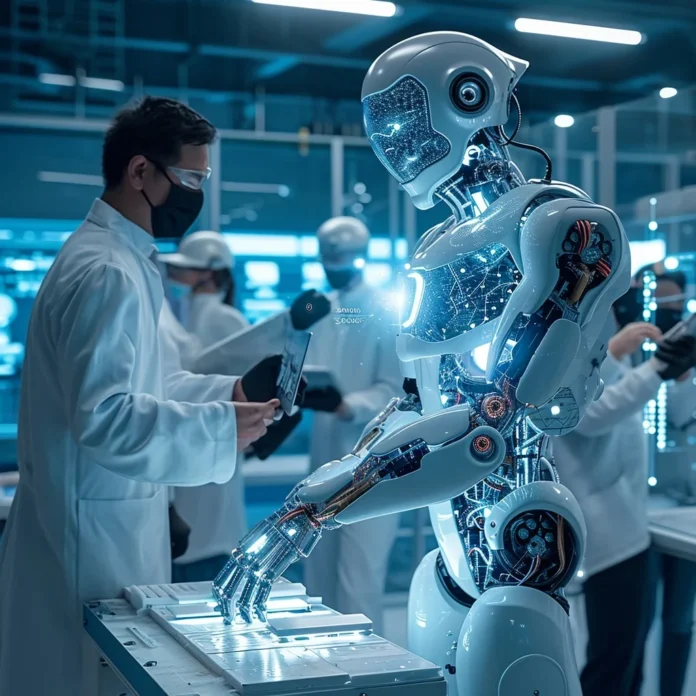Lab automation has long been a dream for many researchers, promising faster results, higher reproducibility, and reduced manual error. However, for decades, the high cost and complexity of integration kept fully automated labs out of reach for smaller institutions and individual researchers. Trilobio, led by co-founder and CEO Roya Amini-Naieni, is working to change that. With a modular, no-code platform and auto-calibrating robotic systems, Trilobio aims to make scalable and affordable automation a reality for biology labs around the world.
What Is Trilobio?
Founded two and a half years ago, Trilobio builds intelligent lab automation tools that simplify biology workflows. The company’s flagship products—modular robots dubbed “Trilobots”—snap together to form fully automated systems capable of handling complex experiments in molecular and synthetic biology. Already being piloted in labs across the United States, Trilobots are being used in areas such as biotherapeutics, rare cancer research, and bio-prospecting, with a commercial launch on the near horizon.
READ MORE: Lexus Unveils Human-Centric Future of Mobility at Milan Design Week 2025
“Our mission is to make fully automated laboratories accessible to every biologist,” says Amini-Naieni.
What Makes Trilobio Different?
At the heart of Trilobio’s innovation is accessibility. Traditional lab automation often requires expensive hardware and intensive engineering support. Trilobio’s platform disrupts that model with systems that are:
- Modular – Robots can be customized and snapped together like Legos.
- Affordable – Designed without the need for pricey integration services.
- No-code – Operated via intuitive software modeled on a lab notebook interface.
This allows labs of all sizes to implement automation without specialized engineering or programming knowledge. Once a researcher documents an experiment, Trilobio’s research engine converts the notes into optimized machine code, tailored to the specific configuration of that lab’s equipment.
Solving the Calibration Challenge
One of the most time-consuming barriers to lab automation is calibration—traditionally a manual task requiring calipers and significant time investment.
Trilobio eliminates this issue with its auto-calibration system, which completes the process in under eight minutes. This innovation drastically reduces setup time and ensures accuracy, especially critical when dealing with complex or high-throughput experiments.
Automation Without Programming
Perhaps the most radical simplification Trilobio brings is its user interface. The company’s software requires no coding experience and serves as a lab information management system (LIMS). It tracks every tool, reagent, and piece of labware on the deck.
This level of abstraction also makes collaboration seamless. Scientists can share experiments across labs with completely different setups—more or fewer robots, different pipettes or reagents—and the software automatically adapts the experiment for the available resources. This flexibility dramatically increases reproducibility, a long-standing issue in biological sciences.
Releasing Scientists to Focus on Discovery
By automating low-level, repetitive tasks, Trilobio empowers researchers to concentrate on experimental design and innovation.
“We want full automation to be the norm rather than the exception,” Amini-Naieni explains. “The creative potential is immense when scientists are free to think big.”
With automation, experiments can run overnight or over weekends, maximizing productivity and freeing up human resources for more intellectually demanding work.
A Biologist-Driven Solution
Trilobio’s founder is not just a technologist—she’s a scientist. Roya Amini-Naieni brings a unique perspective as a former biology researcher frustrated by the expense and inaccessibility of automation technology in academia.
“We’ve designed our platform to be user-friendly and affordable, so even a small academic lab can access advanced automation. That’s never been possible before.”
This mission of democratizing automation is at the core of Trilobio’s design decisions.
Big Potential in Microfluidics
One particularly exciting application for Trilobio’s platform is in the field of microfluidics. The company’s robots can interface with microfluidic chips, allowing:
- Miniaturization of experiments
- Reduced reagent consumption
- Faster execution
Roya compares the role of microfluidics in automation to that of GPUs in computing, predicting that chip-based biology could become a new standard.
Looking to the Future
Trilobio’s next steps include scaling the platform for full commercial release and expanding its user base across academic, government, and commercial labs. Long-term, the company envisions a future where high-throughput, reproducible experiments are possible in every lab, regardless of budget or location.
About the Founder
Roya Amini-Naieni is the CEO and co-founder of Trilobio. A graduate of Harvey Mudd College, where she studied mathematics, computer science, and biology, she has conducted research at institutions like the University of Washington and Asimov. She founded Washington state’s first non-collegiate iGEM team, is a 776 Fellow, and was named to the Forbes 30 Under 30 list.
Conclusion
Trilobio is ushering in a new era of smart, scalable, and accessible lab automation. By reducing the barriers of cost, complexity, and technical skill, the company is opening the door to more inclusive and productive scientific discovery. Whether in cancer research, synthetic biology, or microfluidics, the Trilobot revolution could reshape the life sciences for decades to come.
